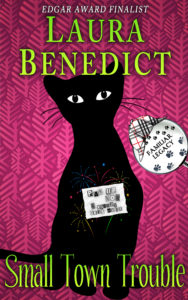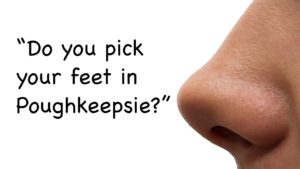By SUE COLETTA
We have another brave writer who submitted a First Page for critique. My comments will follow.
ACROSS THE ROAD
Edward stepped on the brakes and brought the car to a halt on the edge of the road. Adjusting his rearview mirror, he again looked to make certain his intervention was indeed required. On the streets of Accra two people fighting was hardly a novel sight, and third party intervention was not always welcome. But the man still held the young woman by her throat, and she squirmed in vain to break free.
Edward turned off the engine, took out the keys, and stepped out of the car.
It hit him like a falling object. “What the…?” he muttered. Cupping his hand over his eyes, he looked up.
It was a stupid thing to do. The pain in his head only worsened. He looked at his watch to ensure it wasn’t already mid-day. Even at 7:45 in the morning, the sun churned an unbearable amount of heat. If he kept driving, he’d be in his office in fifteen minutes waiting on an aspirin from his secretary. He squinted in the direction of the helpless young woman, and marched towards her.
Every step he took increased the throbbing in his head. He’d stopped his car only a couple of metres away. Amidst her gasping and choking, Edward heard the woman say, “Let…go of me.” Her small hands slipped and slapped against the man’s vice-like grip.
“Give me my money or else…” The man, who couldn’t have been shorter than six-foot-four, threw up a big, veiny left hand, palm wide open, and began to drop it at a target on the side of her face.
Edward reached it in time. He caught the weapon in his left hand before it reached its target. His fingers barely closed around the thick wrist. “Easy, my friend,” he said.
The man staggered, and Edward’s head exploded. Still holding on to the woman, the man turned his eyes from her to Edward. Deep furrows in his forehead marked his confusion. In a quick movement Edward transferred the seized hand from his left hand to his right. With his left hand he grabbed the choking hazard and calmly said to the brute, “Let her go.”
For a brief moment the two men glared at each other in a not-so-epic Mexican stand-off. Edward fixed his gaze. Too many times he’d been told he had kind eyes.
* * *
The writer has given us a peek into Edward’s character and we’re thrown into an action scene. Yet the writer didn’t hook me enough to turn the page. Why? Because when we don’t resist the urge to explain every movement in detail, it ruins the suspense. Readers are smart. Trust us to fill in the blanks. I’ll give you a quick example.
He reached for the bloody rag. By two fingers he pulled it from the stranger’s grasp, then retracted his arm.
See how overly descriptive that is? Remember, every word counts.
He snatched the bloody rag.
Same action. Same visualization. Four words instead of 19. We know what it looks like to snatch a rag from someone’s hand. Too many body movements slow (or stop) the suspense rather than enhance it.
The Headache
Throughout the first page we learn about Edward’s headache. I’m guessing these episodes play a key role in the story. In which case, the writer has done a good job of showing us how migraines start as a dull ache and little by little build into mind-numbing pain.
A word of caution here. Headaches aren’t all that interesting, nor are migraines. They help gain empathy for the MC, but they’re not enough to carry an entire story. Unless— and this is key—these migraines are a symptom of something larger. Jason Borne had migraines after the CIA erased his identity. If Edward went through a similar procedure, then you need to drop a few clues. As it stands now, Edward’s an average Joe who makes his secretary bring him aspirin. Speaking of, unless the story takes place before the 1970’s, this tidbit makes Edward look like a male chauvinist pig. Do you want to turn your female readers against Edward?
Word Choices
Throughout the first page the writer chose odd wording. For clarity, the brave writer’s questionable word choices are in red, my remarks in blue. Please add your own helpful suggestions in the comments.
Edward stepped on the brakes and brought the car to a halt on the edge of the road. “Brought” is generic. The edge of the road makes me think Edward stopped at the edge of a steep cliff. Breakdown lane or dirt shoulder may work better.
It hit him like a falling object. What hit him? “It” tells us nothing.
The man, who couldn’t have been shorter than six-foot-four (don’t confuse the reader with odd wording. If he’s the size of a Patriot’s linebacker, say so), threw up a big, veiny left hand (first, gross; second, unless Edward is inches away he wouldn’t be able to see the dude’s veins), palm wide open, and began to drop it at a target (what target? Did a bullseye suddenly appear on her cheek?) on the side of her face.
Edward reached it (reached what?) in time. He caught the weapon (there’s a weapon now?) in his left hand before it reached its target (I still don’t see a target).
Adjusting his rearview mirror, he again looked (did he look a first time?) to make certain his intervention (intervention reminds me of an alcoholic who needs to get sober) was indeed required.
Also, the first line is nowhere near strong enough for an opener. Rather than rehash TKZ’s sound advice on first lines, I’ve linked a few posts that may help HERE, HERE, and HERE.
Always try to use strong action verbs. You can find an active verb pdf HERE.
On the streets of Accra two people fighting was hardly a novel sight, and third party intervention was not always welcome. The first half of the sentence shows us that Accra isn’t a safe place. Bravo! After the comma, however, is called over-writing. Most people don’t like others prying into their business. Because it’s common sense and it doesn’t help to clarify, well, anything, we can (and should) delete.
But the man still held the young woman by her throat (still? This is the 1st time you’ve shown us), and she squirmed in vain (meh. You can do better) to break free.
Edward turned off the engine, took out the keys, and stepped out of the car.
Unless men have a habit of strangling women on the side of the roads in Accra, the terror should be palpable. He’s killing her! Yet Edward turned off the engine, took out the keys, and stepped out of the car? No, no, no.
Edward slammed the shifter into park and leaped out the driver’s door. “Let go of her, you bastard!”
Force us into that fight! Let us feel Edward’s face flush with rage as he witnesses a man beat on a woman half his size.
Let’s jump ahead.
The man staggered, and Edward’s head exploded. His head exploded? What a mess! I understand what the writer is trying to convey here, but I can’t help but giggle every time I read that line. Migraines are no joke, though. Please choose words that best describe how painful they are.
Example:
A volcanic blast exploded within Edward’s head. Vision blurred. Words jumbled. With a flat hand, he latched on to the hood to steady his gait. The goon dragged the woman by the hair, but Edward couldn’t react. The migraine held him hostage.
Still holding on to the woman, the man turned his eyes from her to Edward. How does one turn their eyes? I’m able to “shift” my eyes, but alas, I cannot turn them. I’m also a stickler for “eyes” that shoot across a room. “Gazes” can shoot to and fro. They can also roam, wander, and dance. Eyeballs, to my knowledge, remain in their sockets at all times. Unless, or until, someone pries them out.
Deep furrows in his forehead marked his confusion. Simple, clear, paints an image in the reader’s mind. Well done!
In a quick movement Edward transferred the seized hand (Seized? Money and property can be seized, hands cannot) from his left hand to his right. With his left hand (avoid repetition. In less than two sentences the word “hand” is used three times. Too many details confuse the reader. Which hand did what now?) he grabbed the choking hazard (I must admit, I’ve reread this first page umpteenth times and am still unsuccessful in finding “the choking hazard.” To me, a choking hazard is a small toy or toy part that we keep away from babies and toddlers) and calmly said to the brute, “Let her go.”
For a brief moment the two men (we’re not in Edward’s head anymore) glared at each other in a not-so-epic Mexican stand-off (cliché). Edward fixed his gaze (this works better than the preceding sentence; good job here!). Too many times he’d been told he had kind eyes (delete this line. Not only is it irrelevant, but it makes no sense in this context).
To review
- Resist the urge to explain every single body movement.
- Choose words carefully.
- Avoid repetition.
- Trust the reader to fill in the blanks, but give us enough information to do so.
- Know your audience.
Over to you, TKZers. What tips would you give this brave writer?










